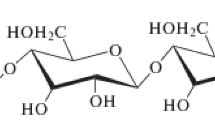Summary
Certain aspects of the pharmacodynamics of bacterial pyrogenic polysaccharides were studied in this work. It was established that there is an increase of the body temperature in animals, which lasts for 6–7 hours, following parenteral administration of this preparation in the dose from 1γ per kilogram and over. Preliminary administration of novocaine and anesthesia to these animals causes delay in the rise of body temperature and decreases the degree of its rise. The preparation has mild anti-inflammatory properties and its toxicity is low. It has no effect on respiration and blood pressure in the doses of 2–20 γ per kilogram of body weight. There is no disturbance of diuresis following administration of this preparation.
Similar content being viewed by others
Explore related subjects
Discover the latest articles and news from researchers in related subjects, suggested using machine learning.Literature Cited
I. A. Oivin and K. N. Monakova, Farmakol. i Toksikol. 16, 6, 50–51 (1953).
D. T. Hankel, R. B. Mefferd, and J. B. Loefer, Texas Repts. Biol. and Med. 11, 3, 494–501 (1953).
L. C. Greene, Amer. J. Physiol. 167, 3, 789–789 (1951).
Randolph and Rollins, Ann. Allergy 8, 5, 626–640 (1950).
Windi and Chambers, J. Comp. Neurol. 93, 2, 241–257 (1950).
Author information
Authors and Affiliations
Rights and permissions
About this article
Cite this article
Vasilyev, P.V., Saksonov, P.P. Pharmacology of pyrogenic bacterial polysaccharides. Bull Exp Biol Med 44, 1231–1234 (1957). https://doi.org/10.1007/BF00791112
Received:
Issue Date:
DOI: https://doi.org/10.1007/BF00791112




